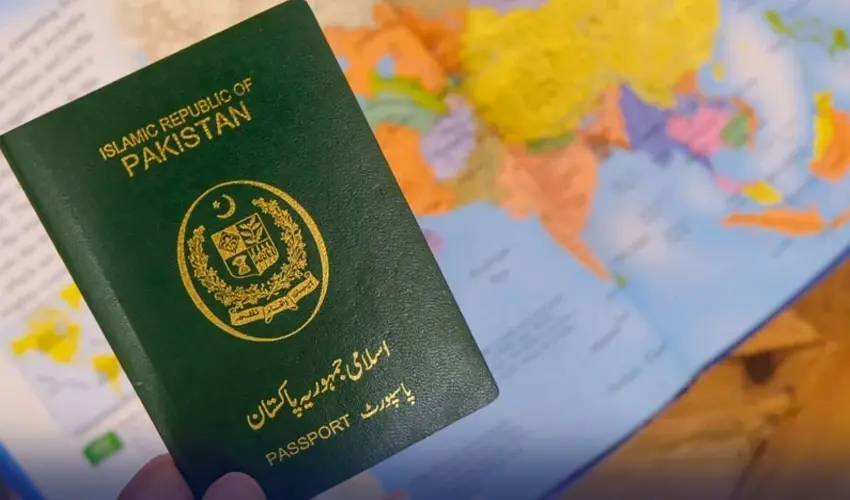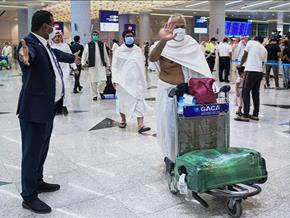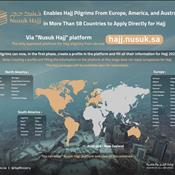
Lahore, Pakistan – The World Health Organization (WHO) has reportedly decided to extend the travel restrictions currently in place concerning Pakistan, according to sources close to the international health body. This decision, if officially confirmed, will likely have significant implications for international travel to and from Pakistan, impacting various sectors including tourism, business, and family travel. The extension of these travel restrictions underscores ongoing health concerns that the WHO deems necessitate continued limitations on cross-border movement involving Pakistan.
The exact nature and duration of these extended travel restrictions remain subject to official announcement by the WHO. However, speculation is rife regarding the factors that have led to this reported decision. Public health experts suggest that a combination of epidemiological data, the prevalence of certain health conditions, and the effectiveness of mitigation measures within Pakistan are likely key considerations for the WHO's stance on international travel.
Rationale Behind Continued Travel Restrictions
While an official statement from the WHO is awaited, several potential factors could be contributing to the reported extension of travel restrictions related to Pakistan. These may include:
- Persistent Health Challenges: Ongoing outbreaks or a high prevalence of specific infectious diseases within Pakistan could be a primary concern for the WHO. The international health body prioritizes preventing the cross-border spread of diseases that could pose a global public health risk.
- Surveillance and Response Capabilities: The WHO may be assessing the capacity of Pakistan's public health infrastructure to effectively monitor, detect, and respond to potential health threats. Concerns regarding surveillance systems or response mechanisms could influence the decision on travel restrictions.
- International Health Regulations (IHR): The WHO operates under the framework of the International Health Regulations, which provide a legal framework for preventing the international spread of disease. Decisions regarding travel restrictions are often made in accordance with these regulations, balancing public health protection with the need to minimize disruption to international travel and trade.
- Global Health Landscape: The broader global health situation, including the prevalence of diseases in other regions and the potential for international transmission, can also influence the WHO's recommendations regarding travel restrictions for specific countries like Pakistan.
- Vaccination and Immunity Levels: The level of vaccination coverage and overall population immunity within Pakistan against relevant infectious diseases might be a factor in the WHO's assessment of the risk associated with international travel involving the country.
Impact of Extended Travel Restrictions on Pakistan
The continuation of travel restrictions will undoubtedly have a multifaceted impact on Pakistan. These impacts could include:
- Economic Implications:
- Tourism Sector: A significant blow to the tourism industry, with reduced inbound and outbound travel affecting hotels, airlines, travel agencies, and related businesses.
- Trade and Commerce: Potential disruptions to international trade and business travel, impacting supply chains and economic growth.
- Overseas Employment: Challenges for individuals seeking overseas employment or those needing to travel for work purposes.
- Social and Humanitarian Consequences:
- Family Reunions: Hindrance to families separated by borders, preventing timely reunions.
- Educational Opportunities: Obstacles for students seeking to study abroad or returning to Pakistan after completing their education.
- Medical Travel: Difficulties for individuals needing to travel abroad for specialized medical treatment or for those seeking medical care in Pakistan.
- Diplomatic and International Relations: Potential strain on diplomatic relations and international cooperation due to the perceived impact of the travel restrictions.
Potential Measures and Recommendations
In light of the reported extension of travel restrictions, several measures and recommendations might be considered by both the WHO and the government of Pakistan:
- Enhanced Public Health Measures in Pakistan:
- Strengthening disease surveillance and reporting systems.
- Implementing and enforcing robust infection prevention and control measures.
- Accelerating vaccination campaigns for relevant diseases.
- Improving public health communication and awareness.
- Collaboration and Communication:
- Close collaboration between the WHO and the health authorities in Pakistan to address the underlying health concerns.
- Transparent and timely communication from both the WHO and the Pakistani government regarding the rationale and duration of the travel restrictions.
- Regular review of the travel restrictions based on evolving epidemiological data and the effectiveness of implemented measures.
- Mitigation Strategies:
- Exploring the possibility of differentiated travel restrictions based on vaccination status or other risk factors.
- Implementing stringent testing and quarantine protocols for essential travel.
- Providing financial and other forms of support to sectors affected by the travel restrictions.
Global Precedent and Context of Travel Restrictions
The use of travel restrictions as a public health measure is not unprecedented. During various global health emergencies, the WHO and individual countries have implemented limitations on international travel to contain the spread of infectious diseases. The effectiveness and proportionality of such measures are often debated, with considerations balancing public health protection against economic and social impacts.
The COVID-19 pandemic, for instance, saw widespread implementation of travel restrictions globally, including for Pakistan at various times. These restrictions evolved over time based on the changing epidemiological situation, the emergence of new variants, and the availability of vaccines. The current reported extension of travel restrictions concerning Pakistan needs to be understood within this broader context of global health security and the role of the WHO in providing guidance and recommendations to member states.
The Role of the World Health Organization (WHO)
The WHO plays a crucial role in global health governance, including providing guidance and recommendations on measures to prevent the international spread of diseases. Its decisions and recommendations regarding travel restrictions are based on scientific evidence and an assessment of public health risks. The WHO works with member states to implement the International Health Regulations and to ensure a coordinated global response to health threats.
While the WHO provides recommendations, the implementation of travel restrictions is ultimately the prerogative of individual countries. However, WHO guidance often carries significant weight and influences national policies. The reported extension of travel restrictions concerning Pakistan suggests that the WHO continues to have concerns regarding the health situation in the country and believes that these measures are necessary to protect global public health.
Public Reaction and Future Outlook in Pakistan
The news of a potential extension of travel restrictions is likely to elicit a range of reactions within Pakistan. While some may understand and support the measure as necessary for public health safety, others may express concerns about the economic and social consequences. Businesses, particularly those reliant on international travel, are likely to voice their concerns and call for mitigation measures.
The future outlook regarding these travel restrictions will depend on several factors, including:
- The evolution of the health situation within Pakistan.
- The effectiveness of public health interventions implemented by the Pakistani government.
- The global epidemiological landscape.
- The ongoing dialogue and collaboration between Pakistan and the WHO.
It is crucial for all stakeholders to remain informed about official announcements and guidelines from the WHO and the relevant authorities in Pakistan. Transparency and clear communication will be essential in navigating the challenges posed by these continued travel restrictions.
Summary of Key Points Regarding Travel Restrictions and Pakistan
To summarize the key aspects of this hypothetical news report:
- The WHO has reportedly decided to extend the travel restrictions currently in place for Pakistan.
- This decision is likely based on ongoing health concerns and an assessment of the public health situation in Pakistan.
- The extension of travel restrictions could have significant economic, social, and humanitarian impacts on Pakistan.
- Enhanced public health measures, collaboration between Pakistan and the WHO, and transparent communication are crucial in addressing the situation.
- The use of travel restrictions is a recognized public health tool with a history of implementation during global health emergencies.
- The WHO plays a vital role in providing guidance on such measures, but individual countries ultimately decide on implementation.
- Public reaction in Pakistan is likely to be mixed, with concerns raised about the consequences of prolonged travel restrictions.
- The future of these restrictions depends on various factors, including the health situation in Pakistan and global health trends.
Detailed Analysis of Potential Health Concerns in Pakistan
While the specific health concerns prompting the reported extension of travel restrictions are not officially stated, several possibilities warrant consideration:
- Resurgence of Infectious Diseases: An increase in the incidence or prevalence of endemic diseases, or the emergence of new infectious agents, could be a significant factor. This might include diseases like dengue fever, malaria, typhoid, or other vector-borne or waterborne illnesses that pose a public health burden.
- Outbreaks of Vaccine-Preventable Diseases: Lower than optimal vaccination coverage could lead to outbreaks of diseases like measles, polio, or other vaccine-preventable illnesses. The international spread of such diseases is a major concern for the WHO.
- Antimicrobial Resistance (AMR): High rates of antimicrobial resistance within Pakistan could also be a contributing factor. The spread of drug-resistant infections poses a global health threat.
- Public Health Infrastructure Limitations: Concerns about the capacity of the public health system in Pakistan to effectively manage and control outbreaks or to provide adequate surveillance data could influence the WHO's assessment.
- Environmental Health Issues: Significant environmental health challenges, such as poor sanitation or air pollution, that could contribute to the spread of disease might also be considered.
Comparative Analysis of Travel Restrictions Globally
It is important to note that travel restrictions have been implemented by various countries and international bodies at different times and for different reasons. A comparative analysis might reveal:
- Types of Restrictions: These can range from complete border closures to mandatory testing, quarantine requirements, vaccination mandates, and specific restrictions on travelers from certain regions.
- Duration of Restrictions: The length of travel restrictions varies depending on the nature and severity of the public health threat. Some restrictions are short-term measures, while others can remain in place for extended periods.
- Economic and Social Impact: The impact of travel restrictions on different countries and sectors can vary significantly based on their economic structure and reliance on international travel.
- Public Acceptance: Public opinion on travel restrictions can be influenced by factors such as the perceived severity of the health threat, the transparency of the decision-making process, and the availability of support measures.
 The Importance of Accurate Information and Official Sources
The Importance of Accurate Information and Official Sources
Given the significant implications of travel restrictions, it is crucial to rely on accurate and verified information from official sources. These include:
- The World Health Organization (WHO) website and official communications.
- The Ministry of National Health Services, Regulations and Coordination of Pakistan.
- Official travel advisories issued by governments of other countries.
- Reputable international news organizations that adhere to journalistic standards.
Misinformation and speculation can lead to confusion and anxiety. Therefore, it is essential to seek information from trusted sources and to be critical of unverified reports circulating on social media or other platforms.
Potential Pathways for Easing Travel Restrictions
If the reported extension of travel restrictions is confirmed, it is important to consider the potential pathways that could lead to their eventual easing or removal. These might include:
- Significant Improvement in Public Health Indicators in Pakistan: A sustained reduction in the incidence and prevalence of the health concerns that prompted the restrictions.
- Strengthening of Public Health Infrastructure: Demonstrated improvements in surveillance systems, testing capacity, and response mechanisms in Pakistan.
- Successful Implementation of Mitigation Measures: Evidence that measures such as vaccination campaigns, infection control protocols, and public health education are effectively containing the spread of disease.
- Reciprocal Arrangements with Other Countries: Agreements with other nations to recognize health certifications or implement harmonized travel protocols.
- Updated Guidance from the WHO: A reassessment by the WHO leading to a revision of their recommendations based on evolving scientific evidence and the global health landscape.
The reported extension of travel restrictions concerning Pakistan highlights the ongoing challenges of balancing public health security with the need for international mobility. While such measures may be deemed necessary to prevent the spread of disease, they also carry significant economic and social costs. Effective communication, collaboration, and a commitment to addressing the underlying health concerns in Pakistan will be crucial in navigating this situation and working towards a future where travel restrictions can be eased safely and sustainably. The focus must remain on protecting public health while minimizing disruption and supporting the affected populations and sectors in Pakistan.
;More Travel News
-
 14-Jun-2022Saudi Arabia Removes All Restrictions Of Covid Ahead of Hajj
14-Jun-2022Saudi Arabia Removes All Restrictions Of Covid Ahead of Hajj -
 06-Jun-2023Applying for a Tourist Visa to Pakistan 2023
06-Jun-2023Applying for a Tourist Visa to Pakistan 2023 -
 22-Jul-2024PIA Announces 15% Discount on Umrah Tickets: A Step Toward Affordable Pilgrimages
22-Jul-2024PIA Announces 15% Discount on Umrah Tickets: A Step Toward Affordable Pilgrimages -
 10-Feb-2023Hajj Registrations for 58 Countries
10-Feb-2023Hajj Registrations for 58 Countries -
 04-Dec-2019Can We Perform Umrah Every Year
04-Dec-2019Can We Perform Umrah Every Year -
 21-Apr-2024Islamabad to Muscat: New low-cost route launched by Fly Jinnah
21-Apr-2024Islamabad to Muscat: New low-cost route launched by Fly Jinnah -
 11-Jun-2020How To Get Turkey Couple Visa Easily in 2020
11-Jun-2020How To Get Turkey Couple Visa Easily in 2020 -
 07-Feb-2025Hajj & Umrah for First-Timers: Stories & Experiences from Pilgrims
07-Feb-2025Hajj & Umrah for First-Timers: Stories & Experiences from Pilgrims
